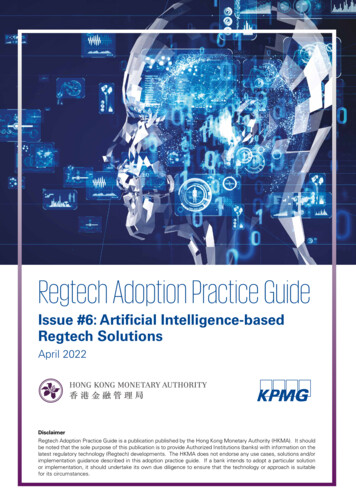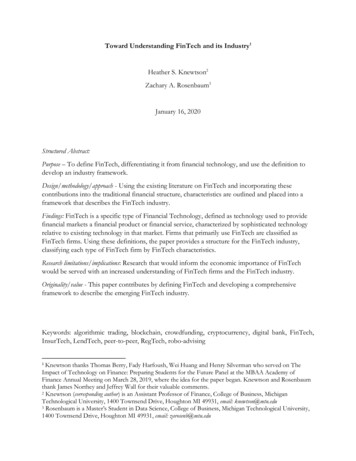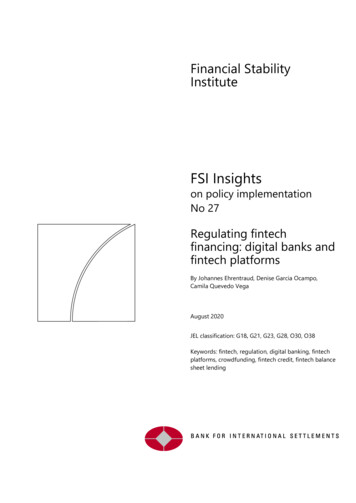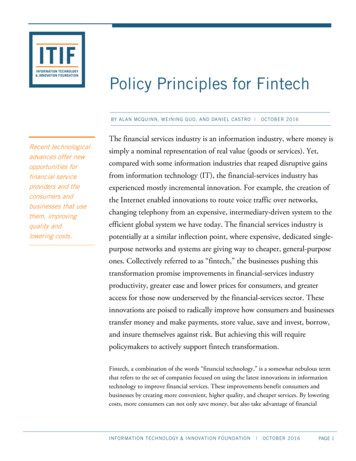
Transcription
FINTECH, REGTECH ANDTHE ROLE OF COMPLIANCE 2021
Thomson ReutersRegulatory IntelligenceNavigate the global regulatoryenvironment with confidenceThomson Reuters Regulatory Intelligence delivers a focused view of the global regulatoryenvironment, empowering compliance professionals to make well-informed decisions tomanage regulatory risk using the most comprehensive and trusted intelligence available.This solution cuts through the complexity and sheer volume of content within the regulatoryenvironment by providing clarity on what is most important for your organization, in acost-effective way. A full and up-to-date view of the regulatory environment, from the broadest globalindustry perspective down to the most granular detail. Coverage of over 1,200 regulatory bodies and more than 4,000 collections of regulatoryand legislative materials from across the world – more than anyone else. Richest source of regulatory content: news, analysis, rulebooks, regulatory events andpractical guidance. Actionable and practical information, from board level reporting to operationalcompliance management.Learn more at legal.tr.com/regulatory-intelligence 2020 Thomson Reuters TR1329889/11-20
ContentsEXECUTIVE SUMMARY04INTRODUCTION06CURRENT SITUATION08BENEFITS12CHALLENGES15ADDRESSING THE CHALLENGES23FINTECH/REGTECH IN THE FUTURE28CLOSING THOUGHTS33All references to this report must be fully cited, credited to Thomson Reuters Regulatory Intelligence.3
Executive summary2020 has been a year of a digital transformation andacceleration to meet the challenges of the COVID-19pandemic. By necessity and by design firms haveimplemented the roll-out of technology, often at speed, toenable business activities to continue as countries went intolockdown. The applications that are covered by the termfintech are fast becoming part of financial services firms’identity. In a marketplace that is still maturing, the questionis whether corporate governance and the culture of financialservices firms have kept up to pace with this new tech.the developing regulatory picture. They must also ensurethey have an appropriate corporate governance frameworkcapable of managing the deployment of fintech systems.The main facts from the survey include:Growth of the marketplaceThomson Reuters Regulatory Intelligence’s (TRRI) fifthannual survey on fintech, regtech and the role of complianceexplores these issues. This year’s survey results representthe views and experiences of more than 400 complianceand risk practitioners.The survey found the adoption and implementation oftechnology has taken a huge step forward during thepandemic, despite the continuing budget challenges thatfirms face. Sector growth is expected to accelerate in thecoming months and years, despite a slowdown in new startups during 2020 due to the pandemic. Firms, and theircustomers, are realizing value from their use of a variety offintech solutions. 70% of firms reported the virus had increased theirreliance on technological solutions, rising to 81% inthe global systemically important financial servicesinstitutions (G-SIFIs) population. Fintech solutions were used across a wide and diverserange of activities, from payments, banking software,crypto assets and stablecoin, insurtech and regtech. The greatest benefits reported were an improvement inefficiency, greater transparency in decision-making andcost reductions. 21% of G-SIFIs are now neutral on fintech innovationand digital disruption, up from 6% last year.Developing corporate governance and cultureFirms must be careful to deploy solutions on solidfoundations and this means getting the corporategovernance right. A quarter of respondents reportedthat boards and risk and compliance functions neededto be more involved in fintech solutions; an absence ofappropriate skill sets may be one reason for this lack ofinvolvement.More G-SIFI firms this year said they were “neutral”, asopposed to “extremely or mostly positive”, when asked theiropinion of fintech solutions. The survey did not explore theunderlying reasons for this shift but it could be that thepandemic has restricted firms’ investment in fintech andmore firms are having to make do with existing applicationsrather than buying new, more advanced applications thatwould meet their needs more closely. 67% of boards were considered to have enoughinvolvement, 68% of risk and compliance functionsare seen to be either fully engaged or having someinvolvement. 31% of firms said that they had yet to invest in skill setsat the board level but knew it was needed, comparedwith just 7% of G-SIFIs. 22% of G-SIFIs had investedand/or appointed specialist skills to the board (12% inthe wider population) and a further 56% (42% in thewider population) reported that they had invested inboard-level skills to some extent. 15% of firms have invested in specialist skills for the riskand compliance function; 24% have not yet done so butknow it is needed.Regtech applications continued to provide popular,embedded solution for firms in areas such as compliancemonitoring, financial crime, AML/CTF, sanctions andregulatory reporting. Budgets were predicted to increase,with a mix of in-house and external solutions the mostfrequent option selected by respondents.Challenges to change and development The greatest challenges firms expect to face in the next12 months were budget limitations followed by digitalservices and payments and keeping up with regulatorychange.Fintech presents extensive opportunities for firms in future.The presence of bigtech and the potential of artificialintelligence (AI) will enable firms to increase customerfocussed initiatives such as financial inclusion. To be ableto exploit these areas firms need to overcome a number ofchallenges: budgetary limitations, weaknesses in corporateskill sets, the limitations of existing IT infrastructure and The main reason firms had not deployed fintech orregtech solutions was a lack of investment or budget,cited by a third of firms. Other reasons included alack of in-house skills, information security and dataprotection concerns and poor IT infrastructure.4
Fintech, regtech and the role of compliance in 2021 9% of firms reported a strategic decision not to usefintech or regtech solutions. More than half (52%) of firms are mostly confidenttheir IT infrastructure is, or will be, able to supportfintech solutions. There has been a shift from firms which employ inhouse solutions, falling to 6% in 2020 from 17% in2019. 12% of firms reported that all regtech solutionswere developed externally. Although this is an increaseon last year (6%) this figure has more than halvedsince 2017 (26%). In parallel, no G-SIFIs reportedsolely developing regtech solutions externally; instead,88% reported a combination of internal and externalsolutions dependent on the challenge to be addressed. 32% of firms said their budget for regtech solutionswould grow in the next 12 months while 25% said thebudget will stay the same (42% for G-SIFIs). 27% of firms lack a budget for regtech solutionscompared with just 4% of G-SIFIs.Regtech 16% of firms reported they had implementedregtech solutions with a further 34% reporting thatregtech solutions were affecting the management ofcompliance. For G-SIFIs this almost halved to 15%(27% last year).The greatest value of regtech was cited as itsimportance to operational management at 38%, whichdoubled in G-SIFIs to 73%.5
INTRODUCTION“[W]e hope that compliance can become more streamlined, efficient and customer-centric – ratherthan a red pen on the page.”Sean Hughes, commissioner at the Australian Securities and Investments Commission, August 2020.Respondents to the fifth fintech, regtech and the role ofcompliance survey were drawn from all sectors of financialservices, from G-SIFIs to technology start-ups. As G-SIFIsare often seen as a leading indicator they were askedto identify themselves to enable comparison betweenthemselves and other, smaller firms.The results of this year’s survey are likely to be uniquegiven the backdrop of the pandemic, but for all that thereis distinct consistency of approach. Firms have focusedon being able to continue to deliver the required goodcustomer outcomes in the face of a challenging anduncertain business environment. Technology has come tothe rescue, enabling firms to adapt, at speed, and continueat least a semblance of business as usual.The report provides an unparalleled insight into howfinancial services firms’ risk and compliance functions haveresponded to digital transformation and how they are usingtechnology to respond to the challenges of the pandemic.TRRI’s survey reports are intended to help financialservices firms with planning, resourcing and direction andallow them to benchmark whether their approach, skills,strategy and expectations are in line with those of the widerindustry. As with previous reports, regional and G-SIFIresults are split out where they highlight a particular trend.The report covers the use of fintech (including regtech,insurtech and suptech) in 2020/1 and the status of themarketplace. It looks at the benefits of introducing fintech intofirms and the challenges this poses the board and risk andcompliance functions. It looks at how firms are addressingthese challenges and how risk and compliance functions canassist firms with this. Finally, the report looks to the future andexplores some of the ways fintech will be developed.Susannah and MikeWhere permission was received, quotes (some anonymized)from respondents have been included where they highlightspecific issues.“Thanks to digital solutions, the banking industry was able to maintain its operational functions duringthe lockdown. But it is becoming more and more apparent that digitalisation, having been very abruptdue to the crisis, is being accompanied by a number of challenges – for example, with regard to cybersecurity. Banks need resilient IT infrastructures; they need to train their staff and develop strategies tocounter IT failures.”Article entitled “Hackers are stepping up their pace” by Raimund Röseler, chief executive director of BaFin’s BakingSupervision, September 2020.6
Fintech, regtech and the role of compliance in 2021DEFINITIONSThe Financial Stability Board (FSB) defines fintech as“technologically enabled innovation in financial services thatcould result in new business models, applications, processesor products with an associated material effect on financialmarkets and institutions and the provision of financialservices.”The Bank for International Settlements defines supervisorytechnology (suptech) as “the use of innovative technologyby supervisory agencies to support supervision”. It helpssupervisory agencies to digitise reporting and regulatoryprocesses, resulting in more efficient and proactivemonitoring of risk and compliance at financial institutions.The UK’s Financial Conduct Authority (FCA) defines regtechas “a subset of fintech that focuses on technologies thatmay facilitate the delivery of regulatory requirements moreefficiently and effectively than existing capabilities.”The FSB defines bigtech firms as “large technologycompanies with extensive established customer networks”.Some bigtech firms use their platforms to facilitate theprovision of financial services. Those that do so can be seenas a subset of fintech firms – a broader class of technologyfirms (many of which are smaller than bigtech firms) thatoffer financial services.The International Association of Insurance Supervisorsdefines insurtech as “the variety of emerging technologiesand innovative business models that have the potential totransform the insurance business.”7
CURRENT SITUATION“Depending on banks’ ability to adapt and adjust their business models, fintech could be viewed asa competitive threat, or as an opportunity to leverage technologies to promote financial innovations,enhance customer experiences, facilitate financial inclusion and achieve greater cost efficiencies.”Edmond Lau, senior executive director of the Hong Kong Monetary Authority, May 2020.Financial innovation and technological solutions havebecome increasingly popular in recent years. The pandemichas led to suffering in many areas of society, financialservices included, but the fintech market continues togrow, and the pace of development is expected to increaseas more of the issues exposed by the pandemic seektechnological solutions.This is equally true elsewhere with all areas of technologypenetration or adoption booming as a result of thepandemic.US e-commerce penetration, %10 years’ growthin 3 months35302520151050200920112013201520172019Q1 2020Source: Bank of America; Forrester Analytics; ShawSpring Research; US Department of Commerce, McKinsey analysisThe long-term outlook for the fintech sector remains highlyfavourable for investors despite the impact of the pandemic,and sector growth is expected to accelerate in the nextcouple of years. In 2020, however, the uncertainty createdby the pandemic has reduced the number of fintech deals inthe UK: in the second quarter of 2020 there were just eight,compared with 19 in the same period of 2019.“The disruption caused by COVID-19 has demonstrated the value of technology in overcoming someof the challenges. Digital innovation may help address issues from the longer-term decline in the useof cash, increase the availability of mass market financial advice, and reduce the need for manualprocesses in businesses. We are committed to supporting innovation that works for all, includingvulnerable customers and smaller firms. We know that our regulatory framework needs to keep pace –focussing on outcomes, and being forward looking.”Nausicaa Delfas, executive director of international, and member of the executive committee at the UK FinancialConduct Authority, July 2020.8
Fintech, regtech and the role of compliance in 2021Use of fintechhas remained largely the same year-on-year, there is ashift from “extremely positive” to a more “neutral” position(21% neutral in 2020 compared with 6% neutral in 2019).In 2020, only 12% of G-SIFIs viewed fintech innovation anddigital disruption as extremely positive (29% in 2019).This year’s TRRI survey asked participants for their viewson the fintech and regtech markets and split resultsbetween G-SIFIs and other firms. For G-SIFIs, while theoverall view of fintech innovation and digital disruptionG-SIFIs: What is your view of fintech (including insurtech) innovation and digital disruption?80%70%60%50%54% 62% 63% 67%40%30%20%10%0%28% 19% 29% 12%16% 15% 6% 21%Overall, extremely positiveG-SIFIs 2017Mostly positiveG-SIFIs 2018NeutralG-SIFIs 20191%4%2%On balance, negative1%Overall, extremely negativexx%G-SIFIs 2020Source: Thomson Reuters Regulatory Intelligence: Fintech, Regtech and the Role of Compliance in 2021, by Susannah Hammond and Mike CowanFor regtech, responses have remained largely the sameacross all firms, with 75% of respondents viewing regtechinnovation in a positive way (21% extremely positive, 54%mostly positive) compared with previous years.9
What is your view of regtech innovation and digital disruption?80%70%60%50%40%30%25% 49% 55% 57% 54%64%20%10%57%22% 26%20% 21% 21%15% 26% 17% 20% 21% 15%2% 3%0%Overall, extremely positiveMostly positiveNeutral2% 3% 3%On balance, negative1%1%Overall, extremely negative2016 2017 2018 2019 2020 G-SIFIs 2020Source: Thomson Reuters Regulatory Intelligence: Fintech, Regtech and the Role of Compliance in 2021, by Susannah Hammond and Mike CowanThe G-SIFI results appear to reflect a dissatisfaction withthe solutions employed, as enthusiasm has moved fromextremely positive to neutral. The pandemic may haveforced these firms to review their budgets and thereforetheir fintech strategies, restricting them to using availablesolutions rather than exploring new, developing areas.Are you developing regtech solutions in-house or are you looking at external solutions?60%50%40%30%41% 44% 55% 56%20%10%0%22% 6% 17% 6%7% 23% 21% 22%26% 13% 6% 12%All regtechA mix and matchAll regtech solutionssolutions developeddepending on thedeveloped externallyin-housechallenge to be solvedWe do not use anyregtech solutions4% 14%Don't know1% 4%Other2017 2018 2019 2020Source: Thomson Reuters Regulatory Intelligence: Fintech, Regtech and the Role of Compliance in 2021, by Susannah Hammond and Mike Cowan10
Fintech, regtech and the role of compliance in 2021The survey asked participants whether firms weredeveloping in-house or external regtech solutions. Overtime, the most popular response has been that firms usea mix of in-house and external solutions, and this trendcontinued in 2020. 56% of firms reported a mix and matchof in-house and external regtech solutions depending onthe challenge to be solved, compared with 41% in 2017.that all regtech solutions were developed externally —although this is an increase on last year (6%), this figurehas more than halved since 2017 (26%). In parallel, noneof the G-SIFIs reported solely developing regtech solutionsexternally; instead, 88% reported a combination of internaland external solutions dependent on the challenge to beaddressed.There has been a shift away from firms employing whollyin-house solutions. This has varied significantly over theyears, falling back down to 6% in 2020 from 17% in 2019.The number of firms choosing to develop regtech solutionsexternally has also fluctuated, with 12% of firms reportingThis leads to the impact of COVID-19. The pandemiccontinues to cause unprecedented chaos and uncertainty,and this will be reflected in responses to this year’s survey,which introduced a question on how the pandemic hasaffected firms’ use of technological solutions.How has the COVID-19 pandemic impacted your firm’s use of technological %2%It has increased relianceon technological solutionsNo changeIt has decreased relianceon technological solutions3%Other2020 G-SIFIs 2020Source: Thomson Reuters Regulatory Intelligence: Fintech, Regtech and the Role of Compliance in 2021, by Susannah Hammond and Mike CowanWhile a quarter of firms said there had been no immediatechange, 70% said the pandemic has increased relianceon technological solutions. This increased to 81% amongG-SIFIs. Regionally, 79% of firms in Asia and 68% of firmsin Australasia said their reliance on technological solutionshad increased as a result of the pandemic.G-SIFIs appear to have been less positive about fintechsolutions this year, and this may reflect difficulties withthe operation of solutions in this new environment. Somefirms may have experienced problems with adapting fintechsolutions, while budget restrictions may have meant thatfirms had to use existing, or more rudimentary, in-housefintech solutions instead of exploring newer, more up-todate offerings.This supports the view that fintech solutions are beingused more, indicating a growing marketplace, and wouldbe consistent with the practical challenges the pandemichas presented, for example, remote working and morewidespread automation of manual processes.This theory is supported by the fact that some participants’responses reflected delays in planning or in theimplementation of technological solutions, as other internalpriorities took precedence during the pandemic.11
BENEFITSFintech solutions cover a wide range of strategic andoperational areas from personal finance, payments,banking software, crypto assets and stablecoin, insurtechand regtech.The area of fintech most relevant to compliance officers’responsibilities is probably regtech. Regulatory processesare increasingly being managed through technology. Theregtech marketplace can be split into a number of areas:risk and compliance management, identity management,regulatory reporting, fraud management and regulatoryintelligence.What solution have you introduced/ are in the process of introducing and to meet whatcompliance need?Source: Thomson Reuters Regulatory Intelligence: Fintech, Regtech and the Role of Compliance in 2021, by Susannah Hammond and Mike CowanWhen asked whether regtech solutions were affecting theway firms manage compliance, respondents identifiedseveral solutions offering automation, monitoringor screening processes. The most common solutionsintroduced were: know your client (KYC) and onboardingtools; automated compliance processes; AML and sanctionscompliance; and regulatory change management.A new question was introduced in this year’s survey toexplore firms’ attitudes toward using regtech. The findingsrevealed that 38% of firms and 73% of G-SIFIs consideredit important to operational management. This was closelyfollowed by the view that it is critical to strategic decisionmaking and a vital part of management information.How is the output from regtech used within your firm?It is considered important tooperational managementIt is considered absolutelycritical to strategic decisionmaking and a key partof management informationIt is only used by riskand compliance functionIt is only usedoccasionally outside of therisk and compliance 0%G-SIFIs 202040%50%60%70%80%xx%Source: Thomson Reuters Regulatory Intelligence: Fintech, Regtech and the Role of Compliance in 2021, by Susannah Hammond and Mike Cowan12
Fintech, regtech and the role of compliance in 2021In addition to the benefit that practical applications bringto financial services generally, the survey asked firms aboutthe specific, individual benefits the use of technology hadbrought.The greatest benefits/values you expect your firm to see from financial technology in thenext 12 months are “Improve our monitoring capabilities, allowing us to focus on the decision-making process andrisk evaluation.”Legal manager and compliance officer, South AmericaThe greatest benefits you expect your firm to see from financial technology in thenext 12 months are Source: Thomson Reuters Regulatory Intelligence: Fintech, Regtech and the Role of Compliance in 2021, by Susannah Hammond and Mike CowanThe top-three areas identified as the greatest benefitsor values firms expect to see from financial technologyin the next 12 months were improved efficiency, greatertransparency in decision-making and cost reductions.The survey was undertaken at the peak of the first wave ofthe pandemic, when cost considerations for firms wouldhave been heightened, but cost reduction and efficiencycame out strongly as main benefits from the use of fintech.“Technology and innovation are transforming the global financial landscape, presenting opportunities,risks and challenges for regulated institutions and authorities alike. The opportunities offered bysuptech and regtech have been created by a combination of factors that have come to the fore inrecent years. These include the substantial increase in availability and granularity of data, and newinfrastructure such as cloud computing and application programming interfaces. Suptech andregtech tools could have important benefits for financial stability.”The Financial Stability Board (FSB) said in a recent survey aimed at regulators, “The Use of Supervisory andRegulatory Technology by Authorities and Regulated Institutions: Market Developments and Financial StabilityImplications”. October 2020.13
This corresponds with the findings of a recent FSB surveyon regtech aimed at regulators and regulated institutions,which found that enhancing efficiency was seen as theprimary driver of suptech adoption by almost half of theauthorities that responded.identification and mitigation of systemic threats. Betterand more transparent decision making relies on the qualityof the management information and the data available tomake that decision.The fintech industry is growing, and many firms seethe positive benefits fintech applications can bring totheir operations. The pandemic has posed significantchallenges to firms’ use of fintech, but those challenges areopportunities in the fintech world, and ones that appear tobeing overcome by the use of technology.The similarities do not end there. In the TRRI survey,greater transparency in decision making was quoted asthe second most popular reason. Regulators respondingto the FSB survey said that improving insights was thesecond most important demand-side benefit because suchforward-looking, real-time surveillance may allow better14
Fintech, regtech and the role of compliance in 2021CHALLENGES“Regulatory authorities we spoke with noted the wide-ranging challenges they are facing. Theseincluded catching up with the fast-changing landscape, facing budgetary constraints or lack ofexpertise, and managing lobbying pressures from traditional financial institutions. Regulators are alsoresponding to the development of fintech by encouraging and adopting regtech (the use of informationtechnologies (IT) to enhance regulatory processes) and suptech (the use of IT to enhance supervision).”International Monetary Fund, Monetary and Capital Markets Department, ”The Promise of Fintech: Financial Inclusionin the Post COVID-19 Era”, July 2020.While compliance officers should welcome the growthof the fintech industry, it may create challenges in otherareas of the business. Fintech applications, particularlyregtech solutions, provide useful tools to assist complianceofficers in their day-to-day activities, but solutions adoptedin other parts of the business may pose challenges whichcompliance officers need to address to ensure continuedregulatory compliance.The greatest financial technology challenges you expect your firm to face in thenext 12 months are Source: Thomson Reuters Regulatory Intelligence: Fintech, Regtech and the Role of Compliance in 2021, by Susannah Hammond and Mike CowanThe survey asked participants about the challenges firmsexpected in the next 12 months. In summary, budgetlimitations are a particular concern given the impact ofthe pandemic. The volume of regulatory change andthe tracking of evolving regulations and subsequentmanagement of that change were also seen as challengesfor fintech solutions. Another was the need to selecttechnology that will endure, in a marketplace where there isunlikely to be one solution to fix all problems.The greatest financial technology challenges you expect your firm to face in the next 12months are “Finding the right fintech resources and options for our firm that will not be obsolete in two years.”Co-managing partner, law firm, United States15
If your firm has not yet deployed fintech or regtech solutions, what is holding you back?Lack of investment/budget33%36%34%29%Lack of in-house skills12%18%27%37%11%14%22%31%Information security/data protection concerns9%9%14%12%Strategic decision not to usefintech, regtech solutionsPoor IT 19 G-SIFIs 2019 2020 G-SIFIs 2020Source: Thomson Reuters Regulatory Intelligence: Fintech, Regtech and the Role of Compliance in 2021, by Susannah Hammond and Mike CowanLack of budget for investment remains the main reasongiven for firms having failed to deploy fintech or regtechsolutions. Other areas identified were confidentiality, dataprotection, size of the firm and insufficient understandingof the potential of the technology. Other participants saidthey were starting to deploy solutions.Budget and skilled resources“The talent pool, resources and need for expertise are without a doubt major issues for both supervisorsand banks. The demand for data scientists and engineers is higher than supply and continues togrow as both incumbents and firms build a digital infrastructure, from storage on the cloud to cyberresilience defences.”Benoît Cœuré, head of the Bank for International Settlements (BIS) Innovation Hub, August 2020.The survey explored how much of a challenge it was forfirms — at both board and compliance function level — tofind the budget to invest in, and the skilled staff resourcesto manage, regtech. Budgets for regtech solutions aredeclining. In 2020, a quarter of firms said they expectbudgets to remain the same during the next 12 months,while 8% said they expect budgets to reduce. A similartrend can be seen among G-SIFIs, with 42% expectingbudgets to stay the same, compared with 25% in 2019.With the pandemic influencing what firms can spend, more willbe aiming to employ regtech solutions that are cost-effectiveand provide better value for money. Although the demand forregtech products is strong, budget constraints may drive theprice of applications down as firms look for this value.16
Fintech, regtech and the role of compliance in 2021Your firm's budget for regtech solutions over the next 12 months will.50%40%30%35% 38%31% 38% 32%33%20%10%34%34% 12% 23%25%42%7% 31%0%5% 8% 13%7% 11% 1% 4% 8% 8% 24% 9%25% 31% 27% 4%GrowStay the sameBe reducedWe do not have abudget for regtechDon't knowOther2016 2017 2018 2019 2020 G-SIFIs 2020Source: Thomson Reuters Regulatory Intelligence: Fintech, Regtech and the Role of Compliance in 2021, by Susannah Hammond and Mike CowanIn terms of staff resourcing, the survey asked about the rangeof skills compliance functions needed to accommodatefintech solutions. Awareness of the need to widen skillsetshas remained consistent in recent years. In 2020, 67% of firmsreported they have widened the skill set within the risk andcompliance functions to accommodate developments in fintechinnovation and digital disruption, of which 15% had invested inspecialist skills. In 2019, 67% firms reported they had widenedskill sets in the risk and compliance function (51% had done soto some extent, 16% had invested in specialist skills).Have you had to widen the skill set within your risk and compliance functions to accommodatedevelopments in fintech, insurtech and regtech innovation and digital disruption?60%50%40%30%41% 47% 42% 51% 52%20%10%19% 18% 34% 26% 24%15% 28% 13% 16% 15%0%25% 5% 6% 6% 7%Yes, and we've invested inspecialist skillsYe
range of activities, from payments, banking software, crypto assets and stablecoin, insurtech and regtech. The greatest benefits reported were an improvement in efficiency, greater transparency in decision-making and cost reductions. 21% of G-SIFIs are now neutral on fintech innovation and digital disruption, up from 6% last year.










